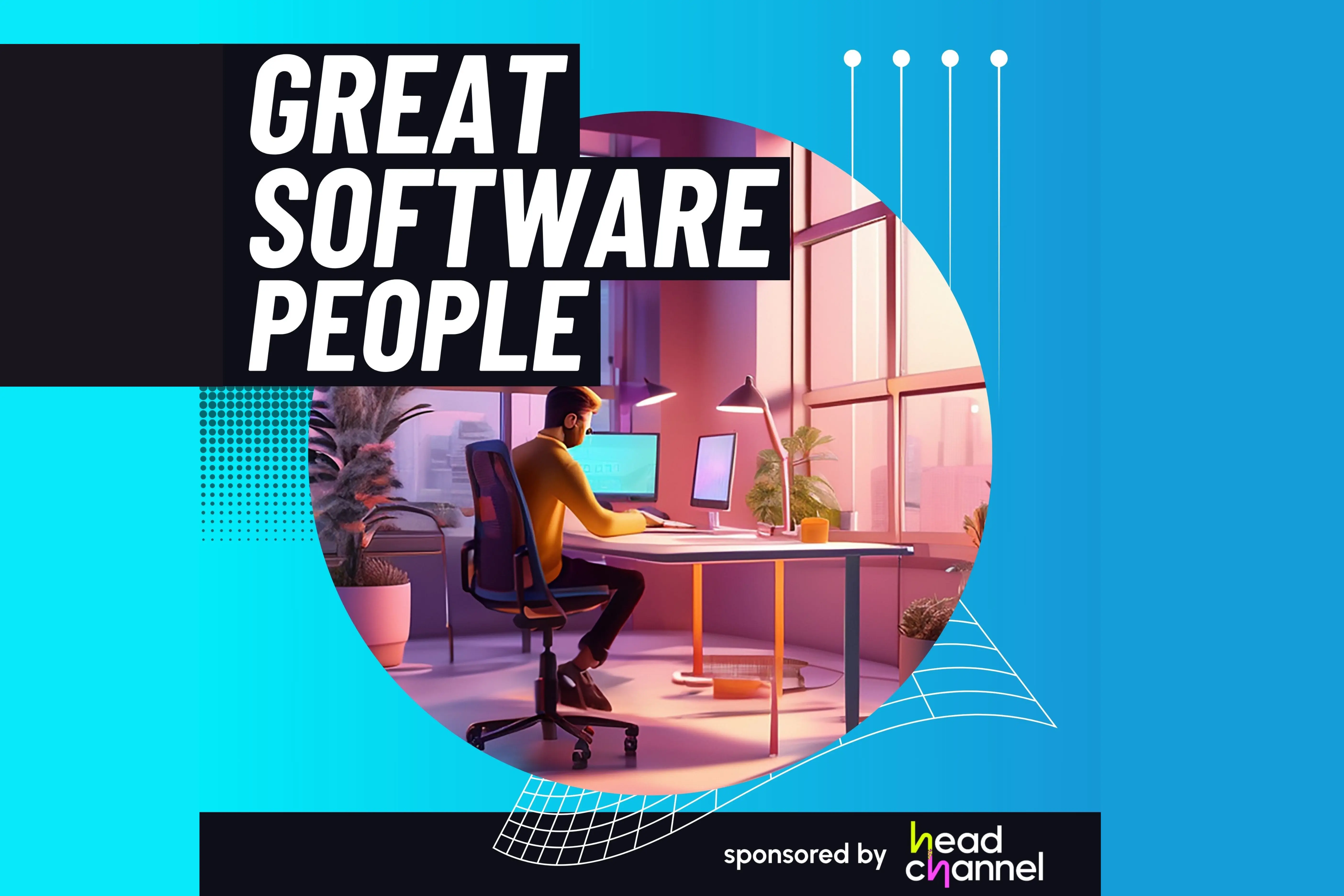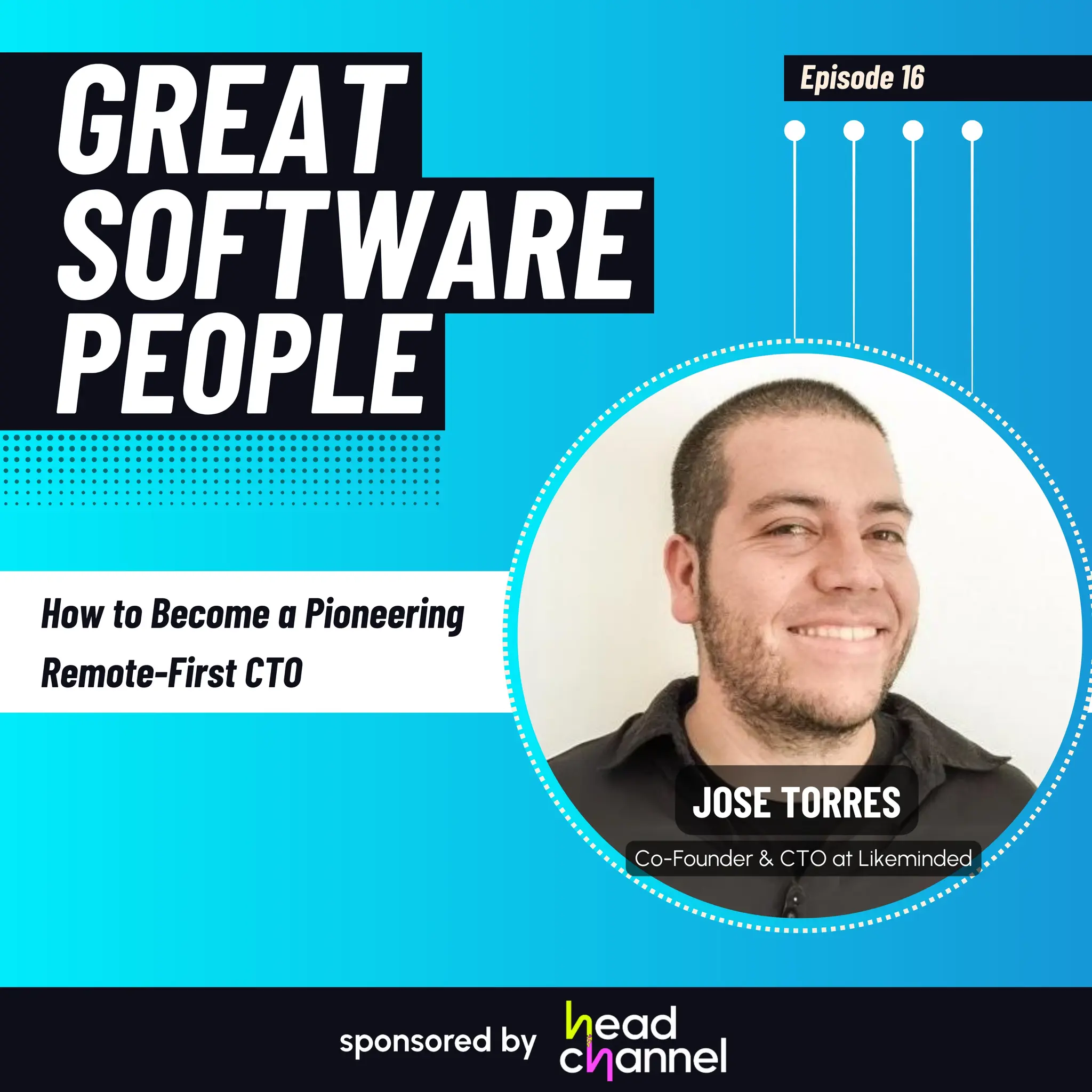
How to Become a Pioneering Remote-First CTO with Wheel.io’s Jose Torres - E16
Industry-leading businesses now don’t come from anywhere… they come from everywhere.
Remote-first companies are nothing new to Jose Torres, whose roles in software saw him embracing hybrid ways of working long before the world was forced into it.
Now CTO at Wheel.io, his story can guide us all on building top class teams around the globe, and how you can build a location-independent career that works for you.
This episode covers:
-
Jose’s early passion for robotics and how it fuelled his software journey
-
The evolution of remote work culture since his time at GitLab, one of the earliest remote-first adopters
-
Invaluable lessons for scaling companies internationally
-
A deep dive into Jose’s current venture, Wheel.io

Episode highlights
“The work I did with the Canadian startup was mostly remote, and I fell in love with remote work pretty quickly from there.” - 10:00 - Jose Torres
“We started Wheel.io and decided to go hybrid instead of fully remote for the ideation sessions, before potentially going fully remote in the future.” - 19:25 - Jose Torres
“Something that’s super important in companies that are working distributed is trust. You trust that someone will reply, and if they haven’t then it’s because they can’t at the moment, they have something of higher priority.” - 16:50 - Jose Torres
“Meta Ads Manager is super cool but super complex - there’s a big learning curve and we’re simplifying that process, making it more fun and omni-channel.” - 29:35 - Jose Torres
LISTEN HERE:
[00:00:13]
Rich: Welcome to another episode of Great Software People! With me today is Jose Torres, CTO at Wheel.io. Hi Jose!
Jose: Hey Rich, thanks for having me.
Rich: It’s great to have you with us. Let’s dive in. When you were growing up, what inspired you to get into tech? Did you dream of being an astronaut, or was it something else entirely?
[00:00:44]
Jose: I think my story is similar to a lot of engineers of my generation. Growing up in Guatemala, I first got exposure to computers when my family got our first PC—I was about eight. That was the spark for me. A year later, we got proper internet access, and it completely blew my mind. I started learning everything I could—programming, hardware, gaming.
[00:01:47]
Rich: Did you start programming right away?
Jose: Not exactly. I was more into robotics at first—that’s still a dream of mine. But my curiosity started with tinkering with games, modifying and tweaking them. That’s what really drew me into tech.
[00:02:30]
Rich: What about your university journey?
Jose: I initially started studying mechanical engineering but had to drop out to support my family. When I returned, I switched to electronic engineering because I was still passionate about robotics. That’s where I got exposure to software. By the time I graduated, I was working mostly in software, even though my degree was in electronics.
[00:03:34]
Rich: So, after university, you started as an IT technician?
Jose: That’s right. I began in IT support—fixing PCs, cleaning printers, and doing basic troubleshooting. It was a humble start, but it helped me work my way up.
[00:05:00]
Rich: Your first real software gig was at Fundamidi, right?
Jose: Yes, at Fundamidi, I worked on building Ruby on Rails applications. It was classic full-stack development: Postgres on the backend, Ruby on Rails in the middle, and JavaScript and CSS on the frontend. That experience set a strong foundation for me.
[00:05:32]
Rich: And then you transitioned into your first CTO role at Bala Meb?
Jose: Yes, but before that, I was an IT manager at a biochemistry lab that served five Central American countries. It was a great opportunity to manage both software and hardware teams. But eventually, I realized the corporate world wasn’t for me—I wanted to innovate. That’s when I co-founded a consultancy with a few friends to bring tech innovation to Guatemala.
[00:08:00]
Rich: After three years of running your consultancy, you moved out of Guatemala. What drove that decision?
Jose: It was a combination of things. The crime rate in Guatemala was a big factor—I wanted a safer environment for my family. Financially, the consultancy wasn’t scaling as much as I needed. I started exploring remote opportunities, which led to roles at a Canadian startup and, eventually, GitLab.
[00:10:13]
Rich: GitLab was a pivotal role for you. Tell us about your experience there.
Jose: GitLab was smaller back then, but it was revolutionary with its remote-first culture. I joined as a service engineer, and our team grew quickly. I learned a lot about working asynchronously across multiple time zones and maintaining open communication with clients and the open-source community.
[00:13:50]
Rich: Remote work is a hot topic today. What challenges did you face working remotely at GitLab?
Jose: Back then, the tools we have today didn’t exist. Communication and collaboration were challenging, especially during crises. For example, during a major database issue, GitLab streamed live troubleshooting sessions to keep clients and the open-source community informed. It was an early example of radical transparency.
[00:15:30]
Rich: Did GitLab’s asynchronous culture require a different skill set?
Jose: Absolutely. Working async requires trust, patience, and excellent communication skills. It’s a mindset shift—you can’t expect instant replies, but you trust your team to respond when they can.
[00:18:27]
Rich: After GitLab, you moved to Adidas. How was that transition?
Jose: It was a huge cultural shift. Adidas was fully on-site, which was the opposite of GitLab’s remote culture. While I learned a lot technically—managing on-prem infrastructure, for example—it took time to adapt to Austria’s culture.
[00:22:00]
Rich: From Adidas, you transitioned back into startups at GeoFly. What drew you back?
Jose: I wanted to work in an environment where I could have a greater impact. Startups allow you to wear multiple hats and contribute across tech, product, and even business. At GeoFly, I managed infrastructure, security, and DevOps teams, which broadened my perspective.
[00:24:48]
Rich: And then you moved on to Lingokids as Head of Engineering. How was that experience?
Jose: Lingokids was more of a scale-up. I managed multiple engineering teams and reported to the VP of Engineering. It was a great learning experience, especially around the concept of “product engineers” and maintaining company culture.
[00:27:00]
Rich: Which brings us to today and your role as CTO at Wheel.io. Tell us about the company.
Jose: Wheel.io simplifies marketing campaigns for small and medium-sized e-commerce businesses. Many of our users are product-focused but struggle with marketing. We streamline their campaign creation using data from their stores and platforms like Google Analytics to provide tailored strategies and AI-generated ads.
[00:31:00]
Rich: That sounds incredible. As we wrap up, where do you see the future of tech heading?
Jose: I think AI will continue to drive massive change, especially as we move from generative AI to general AI. The impact on industries like education and creativity will be enormous. It’s up to us as builders to ensure it’s a positive transformation.
[00:32:45]
Rich: Jose, thank you so much for sharing your journey and insights. You’ve been a fantastic guest on Great Software People.
Jose: Thank you, Rich. It’s been a pleasure.

Contact us.
If you need a partner in software development, we're here to help you.
We will respond to your enquiry immediately.